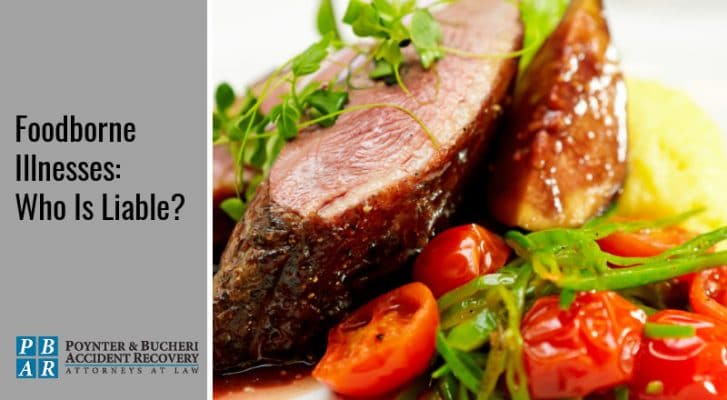
Foodborne Illnesses: Who Is Liable?

What you’ll learn from reading this article:
- How to recognize the signs of food poisoning
- Possible culprits of foodborne illnesses
- What to do if you need to hold somebody liable for your illness
You have probably experienced an upset stomach after a night out, especially after over-indulging. However, what if you experience more than a simple stomach ache? What if you find yourself with a nasty case of food poisoning?
If you have ever experienced food poisoning, you probably had no doubt in your mind what was going on — the symptoms are not exactly subtle. However, it is important to know the difference between a mild stomach ache and a serious medical problem with possible long-term ramifications.
Here are some of the most common signs that you may have ingested something contaminated with bacteria, parasites, or viruses:
- Stomach cramps
- Fever
- Chills
- Diarrhea
- Fatigue
- Muscle aches
- Vomiting
- Headaches
In more severe cases of foodborne illness, you may experience bloody stool, severe cramping, blurry vision, dizziness, dehydration, loss of consciousness, or shock. The Centers for Disease Control and Prevention (CDC) estimates that 48 million people in the United States are sickened every year because of foodborne diseases. Out of that total number, 128,000 people are hospitalized, and — tragically — 3,000 of those people actually die. Not everyone is at equal risk. Many people have strong immune systems that are able to fight off the offending germs, but others are not so lucky.
The people most at risk from foodborne diseases are:
- The elderly — as people age, they tend to have fewer barriers to bacteria.
- Babies and small children — children under the age of one do not have fully developed immune systems yet.
- People with compromised immune systems — this includes people with chronic illnesses such as cancer, diabetes, and liver disease. Not only are their immune systems weakened, but they also may also be dealing with medications that leave them weakened and vulnerable.
- Pregnant women — although their immune systems may not be necessarily weakened, they are altered, and some foodborne illnesses, such as Listeria, can be transmitted to their unborn child and cause miscarriages, premature births, or even stillbirths. Listeria can be found in unpasteurized dairy products, raw fruits and vegetables, and deli meats. Pregnant women are ten times more likely than the general population to get listeriosis.
What is to blame for these daunting statistics? There are many possible culprits, but these foods are the most common:
- Raw or undercooked meat, poultry, and eggs
- Unpasteurized dairy products
- Seafood and raw shellfish
- Unwashed fruits and vegetables
- Sprouts
- Raw flour
Food contamination can occur at any step along the process. It may happen at its origin: for instance, in 2018, a serious E. coli outbreak that caused at least five deaths was traced to Romaine lettuce from the Yuma growing area. In severe cases, E. coli can lead to kidney failure and is responsible for at least 61 deaths in the U.S. annually.
Food contamination may occur during processing, and it may occur during food preparation, such as at a restaurant with lax food prep and hygiene procedures. Foodborne illnesses can also occur as a result of improper storage, insufficient cook times, or because food has been left out for too long. (This can be a particular problem at buffets.)
If you find yourself with a case of severe food poisoning, there are certain steps you should take:
- Seek medical attention immediately. Make sure that your doctor does a stool test to see if you have been contaminated.
- Keep a careful record (or have someone else keep a record) of all of your symptoms as well as when they began and how long they have lasted.
- Write down everything that you have eaten and the time and day when you ate it.
- Keep a sample of the suspected food, if possible.
- If you believe that a restaurant meal was what made you ill, email the restaurant, or if you believe that the guilty food was something you bought at a supermarket, email the supermarket. You will want to keep documentation of EVERYTHING.
- Contact a personal injury attorney who can advise you about your case and who can help you receive compensation for your medical issues and suffering. It is not easy to prove negligence, but it is possible with the right support.
Poynter & Bucheri Accident Recovery — Indianapolis Personal Injury Attorneys
If you or a loved one has been injured physically or mentally by a person, product, or company, you need to know your legal rights. Our personal injury attorneys are experienced with cases like yours and can evaluate what your case may be worth.
We will ensure that you are protected and compensated for your injuries and losses. Don’t hesitate — one of our experienced attorneys can assist you right away. Call 1-800-265-9881 for a free case review.
